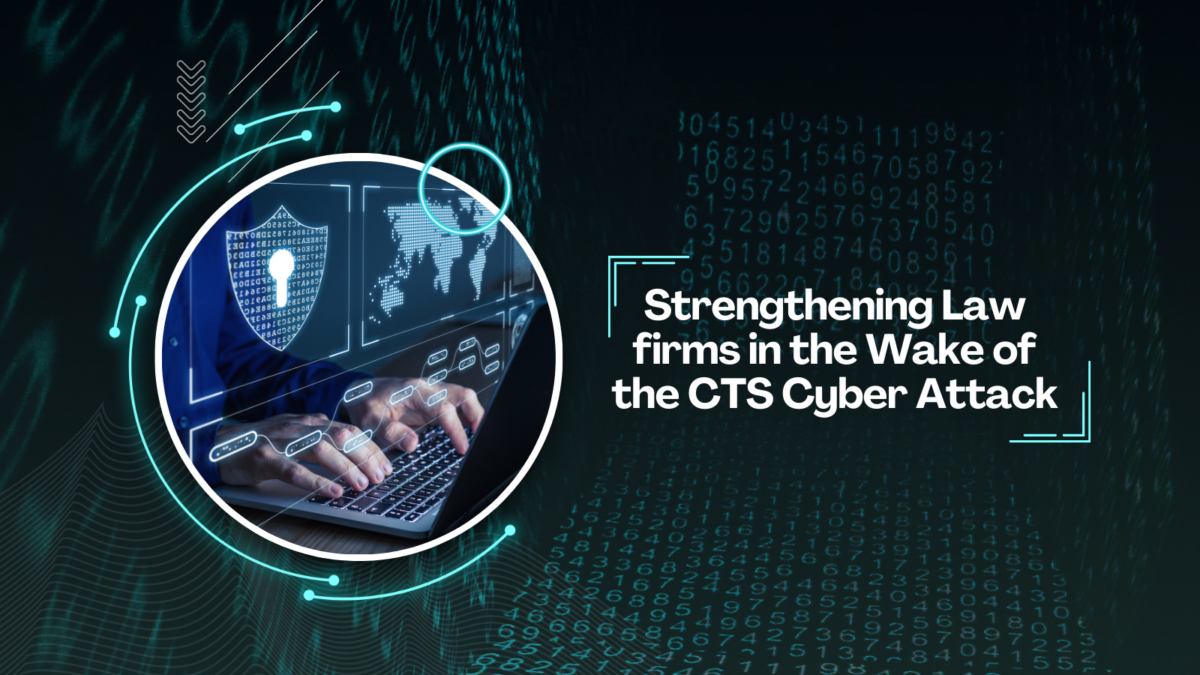Town and Country Planning Act abandoned ‘Four-year rule’, what are the impacts?

The Levelling-up and Regeneration Act 2023 significantly advances the UK's urban development and planning regulations. Enacted on 26th October 2023, this comprehensive reform significantly amends the country's planning system, impacting developers, property owners, and local planning authorities, especially regarding unauthorised developments. One critical change is the amendment to Section 171B of the Town and Country Planning Act (TCPA) 1990, which alters the enforcement period for unauthorised developments.
Previously, the "four-year rule" under the TCPA 1990 provided immunity from enforcement action for developments or land uses existing continuously for four years without challenge. However, the Levelling Up and Regeneration Act 2023 extends this period to ten years in England, effectively doubling it. This extension offers local planning authorities in England a broader timeframe to address unauthorised developments, potentially reducing instances of unauthorised construction.
This amendment significantly impacts enforcement practices, development dynamics, and due diligence processes. Developers and property owners now face increased scrutiny and must exercise greater caution when undertaking projects without proper planning permissions. The extension provides local planning authorities in England with more time to curb unauthorised construction and enhance adherence to planning regulations.
The transitional provision accompanying this amendment ensures consistency in enforcement practices, maintaining the previous four-year enforcement window for developments completed or breaches occurring before 25th April 2024. However, it also introduces regional disparity in planning legislation between England and Wales, potentially resulting in divergent approaches to addressing unauthorised development.
The rationale behind extending the enforcement period is multifaceted, aiming to enhance regulatory compliance, deter unauthorised construction activities, and support sustainable development. Overall, the Levelling-up and Regeneration Act 2023 represents a significant step forward in the UK's planning system evolution, with the extension of the enforcement period for unauthorised development standing out as a prominent amendment.
In conclusion, this legislation heralds a new era in town and country planning, characterised by extended enforcement periods and regional variation in legislation. By providing local planning authorities in England with more time to address unauthorised developments, this change aims to promote regulatory compliance and sustainable development practices. However, it also emphasises the importance of vigilance and strategic navigation of planning regulations in the evolving urban landscape of the UK.
If you plan to purchase a regarding residential properties, commercial properties or engage in any real estate transactions, please get in touch with Chan Neill Solicitors. Our team of property solicitors has extensive experience in assisting local and overseas buyers on their journey to settling in their new homes.
This article is provided for general information only. It is not intended to be and cannot be relied upon as legal advice or otherwise. If you would like to discuss any of the matters covered in this article, please contact us using the contact form or email us on reception@cnsolicitors.com
Continuous residence rule in the Long Residence applications
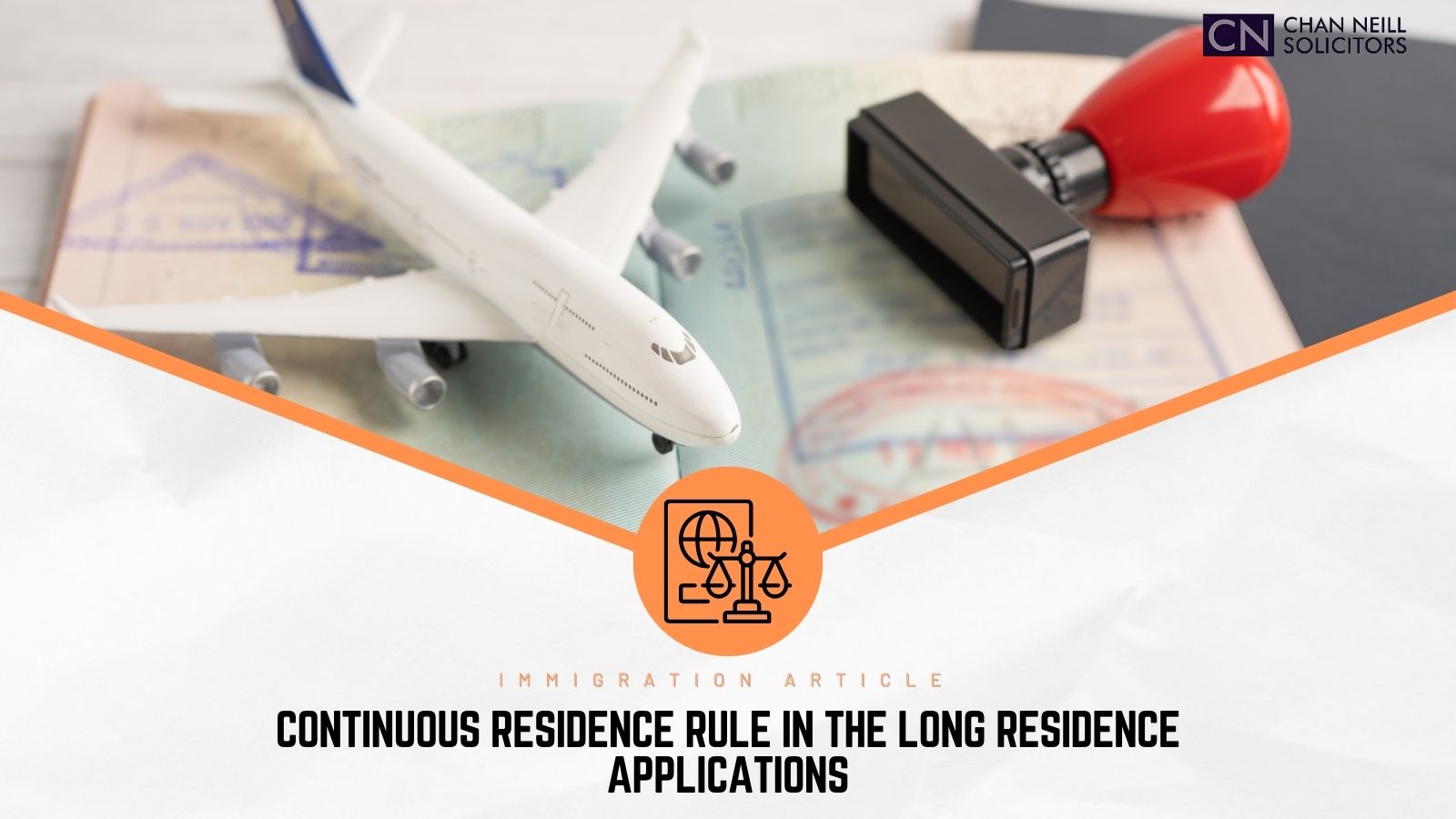
The main requirement for the Long Residence visa category is to spend at least 10 years in the United Kingdom lawfully. The word “lawfully” is defined as having valid permission to be in the UK, such as for study, work, family purposes (but not permission as a visitor or short-term student or a seasonal worker).
The 10-year period that includes time spent in the UK unlawfully is not covered by this post. More information on this can be found in Appendix Private Life.
Appendix Long Residence
The Statement of Changes (“SoC”) in Immigration Rules laid before Parliament on the 14th of March 2024 (HC 590) introduced big changes to the Long Residence route. As such, a new requirement was brought in for applicants to have had their current permission for at least one year before attempting a settlement application under the Long Residence route. In addition, it altered the way of meeting the “Continuous residence” requirement by introducing new absences calculation technique “for greater consistency across immigration rules” [quoted from the Explanatory Memorandum to the SoC (HC 590)]. Although consistency is a value of paramount importance, it remains questionable whether the primary legislation needed consistency in this particular instance.
The newest edition of the Immigration Rules for Long Residence visa route can be found in a recently introduced Appendix Long Residence, which replaced the provisions in Part 7 of Rules. It includes requirements for Permission to stay, Settlement as well as the Transitional arrangements for those, granted an extension of stay on the basis of Long Residence on or before 8 July 2012. The main difference between Permission to stay and Settlement routes is that in the latter, the English Language and Life in the UK test requirements must be met.
Historical background to “Continuous residence” requirement
The Immigration Rules for the Long Residence visa route were first laid before the House of Commons on 31 March 2003 (Statement of Changes HC 538). From there on, and until the 11th of April 2024, ‘Continuous residence’ in the Immigration Rules was defined as:
“residence in the United Kingdom for an unbroken period, and for these purposes a period shall not be considered to have been broken where an applicant is absent from the United Kingdom for a period of 6 months or less at any one time, provided that the applicant in question has existing limited leave to enter or remain upon their departure and return, but shall be considered to have been broken if the applicant:
….
(v) has spent a total of more than 18 months absent from the United Kingdom during the period in question.”
In one of our past articles, we wrote about the Immigration Rules being interpreted differently by the Home Office and the applicants themselves, resulting in refusals and subsequent litigations. The article was focused on the correct interpretation of “existing leave to enter or remain upon their departure and return” within the definition of ‘Continuous residence’, setting out the case law that impelled changes in the Home Office’s decision-making practices. Some years later, the definition of “18 months” was challenged.
Historically, “18 months” was defined by the Home Office as being 540 days. The case [2021] UKUT 65 (IAC) challenged this approach and brought the change to the interpretation of 18 months being 548 days.
Notably, the wording of the relevant paragraph of the Immigration Rules remained unchanged. However, the Home Office’s approach to applying the “Continuous residence” definition in the casework practices was revised.
With the new SoC (HC 590), the Home Office decided that there was time to change the primary legislation, that hadn’t been amended since 2003, and to do so in respect of the absences calculation under the “Continuous residence” requirement. With the new Rules, the 548 days became law rather than a guidance. However, the new absences calculation technique has caused much confusion as the correct approach depends on when the 10-year qualifying residence is completed. The Home Office is known for introducing the requirements that are bafflingly complex and the new Rules under Appendix Long Residence have not been an exemption.
New absences calculation
As of the 11th of April 2024, to meet the “Continuous residence” requirement, the time spent outside of the UK should be calculated as follows:
| 10-year period completed before 11 April 2024 | No more than 548 days during the 10-year qualifying period
No more than 184 days at any one time
|
| 10-year period completed on/after 11 April 2024 | No more than 184 days for any single absence started before 11 April 2024
No more than 180 days in any 12-calendar month period |
Essentially, the Home Office has given the prospective applicants more flexibility in terms of how much time they can spend outside of the UK during the decade in question. However, the concern now arises from the discrepancy in the wording of the Immigration Rules and the Home Office operational guidance in relation to the absences calculation. Such discrepancy is a potential pathway for litigations that, as history serves, may well alter the Home Office's decision-making practices in the future.
Note: This article was prepared on the 25th of April 2024 in line with the version of the Immigration Rules and relevant Home Office operational guidance in place on this date.
This article is provided for general information only. It is not intended to be and cannot be relied upon as legal advice or otherwise. If you would like to discuss any of the matters covered in this article, please contact us using the contact form or email us on reception@cnsolicitors.com
How to navigate salary thresholds under the work visa routes
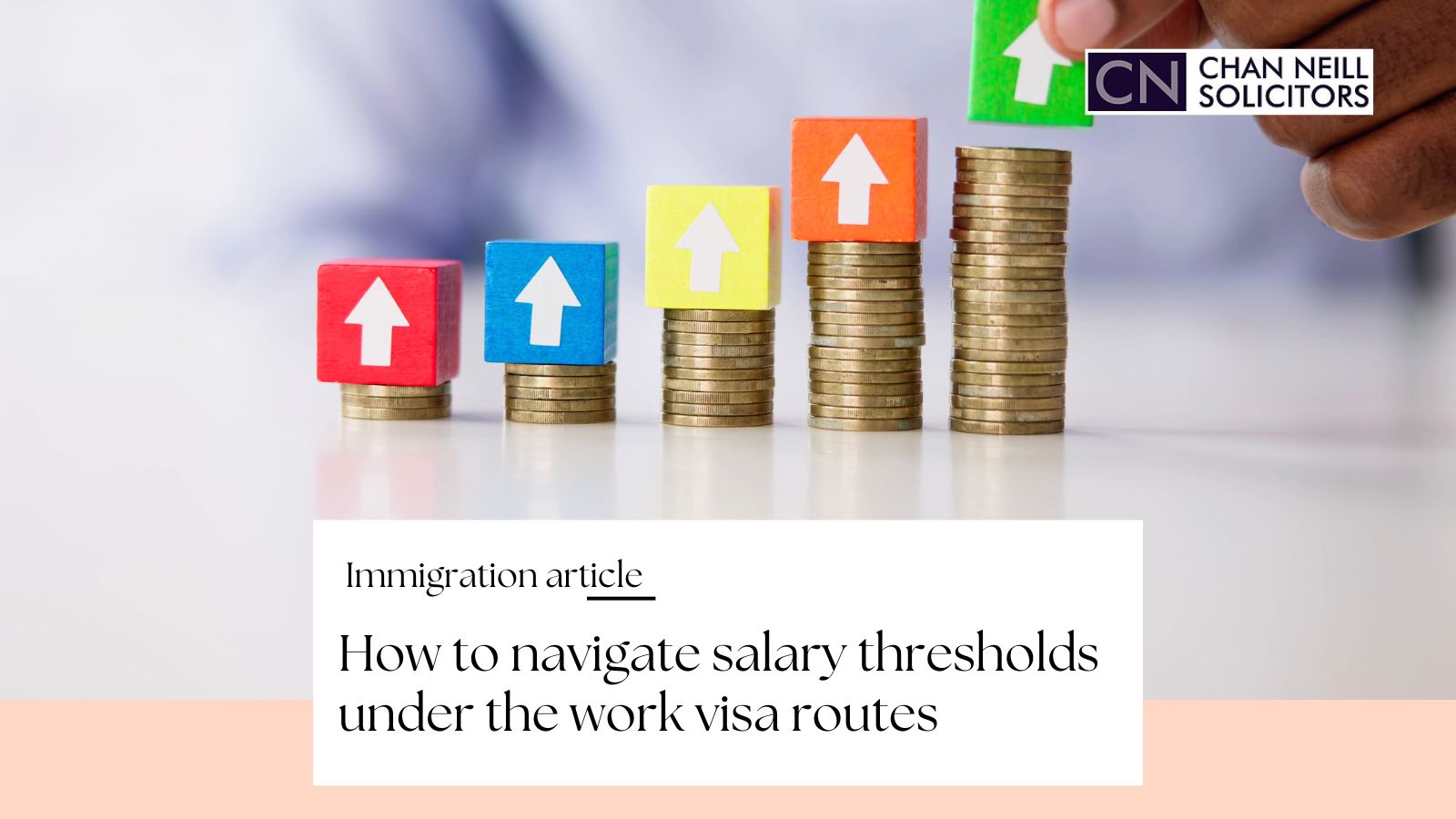
A new Statement of Changes to the Immigration Rules, laid before Parliament on the 14th of March 2024, introduced a sharp increase to the minimum salary thresholds for work routes, including Skilled Worker, Health and Care, Scale-Up and Senior or Specialist Worker routes. In addition, the Shortage Occupation List was replaced by a new Immigration Salary List, specifying the occupations where a reduced salary threshold applies in the Skilled Worker route and the Standard Occupation Classification (SOC) code system was updated from SOC 2010 to SOC 2020. The Home Office has also introduced transitional arrangements for existing work visa holders.
This has resulted in the expansion of the Appendix Skilled Occupations from three tables to six and in the version of the Rules which is difficult to follow. The Home Office operations guidance, which was updated on the 4th of April 2024, is not much of a help. Moreover, there are noticeable discrepancies in the Rules and guidance as well as operational issues since the implementation of the new Rules.
There is a hope that the Home Office will address the identified issues promptly. In the meantime, this post intends to shed light on how to navigate different salary levels when sponsoring migrant workers on the work routes.
Transitional provision
The starting point is to identify whether the prospective applicant falls within the transitional provision. The transitional provision applies when:
- The prospective applicant was granted permission as a Skilled Worker before the 4th of April 2024 and they have had continuous permission as a Skilled Worker since, and the date of application is before 4 April 2030; or
- The prospective applicant’s Certificate of Sponsorship (“COS”) was assigned before the 4th of April 2024 and they have had continuous permission as a Skilled Worker since, and the date of application is before 4 April 2030; or
- The job is eligible for the Health and Care ASHE visa (some conditions apply). More information can be found in paragraph SW A1.1. of Appendix Skilled Worker of Immigration Rules; or
- If being sponsored under Table 2a of Appendix Skilled Occupations, the prospective applicant was sponsored by the same sponsor in the most recent grant of permission and the sponsor continues to sponsor them.
If any of the transitional provisions apply, the minimum salary threshold will be assessed against the following options:
Option F: £29,000 per year, £11.90 per hour and the going rate for the SOC 2020 occupation code
Option G (PhD in a subject relevant to the job): £26,100 per year, £11.90 per hour and 90% of the going rate for the occupation code
Option H (PhD in a STEM subject relevant to the job): £23,200 per year, £11.90 per hour and 80% of the going rate for the occupation code
Option I (Job is in the Immigration Salary List): £23,200 per year, £11.90 per hour and the going rate for the occupation code
Option J (New entrant): £23,200 per year, £11.90 per hour and 70% of the going rate for the occupation code
Option K (Job listed in Health and Education Occupation): £23,200 per year and the going rate for the occupation code (Table 3 of Appendix Skilled Occupations)
The going rate for Options F to J can be found in Table 2 of Appendix Skilled Occupations.
New salary levels
If the job does not fall under any of the above-listed options, then, new salary thresholds apply:
Option A: £38,700 per year, £15.88 per hour and the going rate for the occupation code
Option B (PhD in a subject relevant to the job): £34,830 per year, £15.88 per hour and 90% of the going rate for the occupation code
Option C (PhD in a STEM subject relevant to the job): £30,960 per year, £15.88 per hour and 80% of the going rate for the occupation code
Option D (Job is in the Immigration Salary List): £30,960 per year, £15.88 per hour and the going rate for the occupation code
Option E (New entrant): £30,960 per year, £15.88 per hour and 70% of the going rate for the occupation code
The going rates for Options A to E can be found in Table 1 of Appendix Skilled Occupations.
Changes to Global Mobility and Scale-Up Routes
Alike the Skilled Worker salary thresholds, the salary thresholds for the Global Mobility Routes have gone up. The good news is that the going rates for the Global Mobility Routes will continue to be based on the 25th percentile of roles within the relevant SOC code and can be found in Tables 2 and 2b of Appendix Skilled Occupations. However, the minimum salary thresholds have gone up from £45,800 to £48,500 per annum for Senior or Specialist Workers and from £24,220 to £25,410 for Graduate Trainee applicants.
Important to note that some SOC Codes which were eligible for sponsorship under the Global Mobility Routes are no longer eligible as of the 4th of April 2024. Such codes are now listed in Table 2b of Appendix Skilled Occupations and can be used by someone with permission on this route before the 4th of April 2024 and who is applying for an extension to continue working in the same role.
For the Scale-Up route, the general threshold has been raised from £34,600 to £36,300.
What is next?
By introducing the above changes, as stated in the Explanatory Memorandum, the Home Office intends to encourage UK businesses to invest in the resident workforce rather than over-relying on migration. This has been the aim for many years but changing the immigration policy has not [yet] brought the desired results.
What is certain is that the Immigration Rules are becoming harder to navigate even for experienced immigration practitioners and, coupled with the increase in Immigration Health Surcharge and other visa costs, it could be assumed that this could have been done intentionally to discourage businesses from employing foreign workforce.
This article has been published in line with the relevant Rules and policies that apply on the 24th of April 2024.
This article is provided for general information only. It is not intended to be and cannot be relied upon as legal advice or otherwise. If you would like to discuss any of the matters covered in this article, please contact us using the contact form or email us on reception@cnsolicitors.com
What happens if a fee waiver request has been withdrawn?

What happens if a fee waiver request has been withdrawn?
The answer to this question does not appear to be straightforward.
As a brief background, a fee waiver allows eligible applicants to partially or fully avoid the payment of the Immigration Health Surcharge and/or application fees. The fee waiver option was originally available to in-country applications only. In 2022, the Home Office changed the Rules to allow overseas applicants to apply but only in limited circumstances.
To become eligible, an applicant must demonstrate upon legitimate evidence that they cannot afford the visa application and/or Immigration Health Surcharge fees for a reason of being destitute or at risk of becoming destitute, or, the total income earned is not enough to meet the child’s additional needs. If granted, the actual visa application must be made within 10 working days from the date of the decision on the fee waiver request when applying within the UK or 28 calendar days when applying from outside the UK followed by the submission of biometric data. Important to note that only certain application types are eligible for a fee waiver and applications for Indefinite Leave to Remain in the UK (also known as settlement), even those based on human rights claims, are not eligible for a fee waiver.
The processing times for a fee waiver request have recently been subject to increase, making many wonder what happens if a paid visa application has been submitted whilst a fee waiver request remains pending. This all comes down to section 3(c) of the Immigration Act 1971, or as commonly known “section 3(c)”.
To put it simply, section 3(c) extends one’s permission to remain in the UK lawfully whilst their in-time UK visa application remains pending decision at the Home Office or until all appeal rights associated with an in-time refused visa application are exhausted. In relation to a fee waiver request, without going into many technicalities, if the request has been made before the expiry date of a valid UK visa, the applicant’s rights to remain in the UK lawfully continue at the time when the decision on a fee waiver application has been made and at the time when an actual visa application has been submitted, even if the visa validity already came to an end. But what happens if a fee waiver request has been withdrawn or a paid visa application is made whilst the visa has already expired but a fee waiver request is yet to be decided?
The simple answer is that section 3(c) will not be triggered which means that the person will be an overstayer once their UK visa comes to an end. This is because a fee waiver is not an application for leave to remain in the UK – it is merely a request for the UKVI fees to be waived.
Case study
On 5 November 2023, Tom submitted a request asking the Home Office to waive the payment of the Immigration Health Charge and UKVI fees in relation to his UK Spouse extension application. Tom’s permission to remain in the UK expired on 1 January 2024 and his leave was transitioned to section 3(c).
Tom then realised that on 7 February 2024, he accumulated 10 years in the UK. Tom decided to not wait for the outcome of his fee waiver request and on 11 February 2024 he submitted a paid Indefinite Leave to Remain visa application under the 10-year Long Residence route using an expedited service.
On 11 March 2024, Tom’s application was refused. The reason is that to be eligible for Indefinite Leave to Remain under the 10-year Long Residence, Tom had to demonstrate that he was lawfully present in the UK for a consecutive 10-year period. Unfortunately, making a paid visa application, Tom’s fee waiver request became void, making him an overstayer since 2 January 2024, and therefore, short of lawful 10 years of residence.
The wording in some of the Home Office operation policies might suggest that a fee waiver request submitted in time is treated as an application for leave to remain, however, since the fee waiver is not an application for leave, it cannot be varied.
In the wake of the incredibly high visa fees and legal costs, it is more important than ever to correctly interpret the Immigration Law and requirements to avoid any disappointment and unnecessary expenses. Our Immigration team can assist with very complex immigration matters including fee waiver requests. Contact us for a quick assessment.
This article is provided for general information only. It is not intended to be and cannot be relied upon as legal advice or otherwise. If you would like to discuss any of the matters covered in this article, please contact us using the contact form or email us on reception@cnsolicitors.com
Revocation of the cohabitation requirement for a UK partner visa
 For many years it was a standard practice to comply with the cohabitation requirement when applying as an unmarried partner to join a family member under various immigration routes. With the introduction of a new Appendix relationship with Partner that relaxed the definition of “durable relationship”, the relationship requirements under Appendix FM and Appendix FM-SE have now been brought in line.
For many years it was a standard practice to comply with the cohabitation requirement when applying as an unmarried partner to join a family member under various immigration routes. With the introduction of a new Appendix relationship with Partner that relaxed the definition of “durable relationship”, the relationship requirements under Appendix FM and Appendix FM-SE have now been brought in line.
The unmarried partner visa applies to couples that have been in a durable relationship (not married or in a civil partnership) for at least 2 years. In other words, the couple must demonstrate that they have been in a relationship similar to marriage or a civil partnership for at least 2 years before the date of a UK visa application. The unmarried partner visa option is available not only for partners or British or Irish nationals, persons with settled status in the UK, with protection status, with limited leave under Appendix EU and Appendix ECAA applying under Appendix FM and Appendix FM-SE of the Immigration Rules, but also for partners on the work and study routes.
As history serves, the requirement for unmarried partners in relation to “durable relationship” for many years was that the couple “must have been living together in a relationship similar to marriage or civil partnership for at least the two years before the date of application”. This implied at least two years of cohabitation, regardless of whether the application for a UK visa is submitted within the UK or abroad.
With the introduction of an Appendix relationship with Partner into the Immigration Rules for applicants on work and study routes in 2023, the cohabitation requirement was abolished. Instead, the assessment is now based on the facts of each case, regardless of whether the couple have cohabitated or not.
On the 31st of January 2024, the same approach came into force for applications under Appendix FM and Appendix FM-SE of the Immigration Rules, which is rather welcome news.
As marriage is no longer required as a public display of commitment, unmarried partnerships have become very popular and have a very diverse form within and outside the UK. In addition, with technology playing a very prevalent role in modern society, it brings opportunities, enhances communication and provides couples with a new way of maintaining long-distance relationships. This is particularly relevant in some countries/cultures where cohabitation isn’t permitted or where same-sex relationships are not recognised or accepted. The Home Office’s implementation of cohabitation flexibility to the “durable relationship” requirement, therefore, is excellent news.
Where the couple has not cohabitated or has not lived together for some parts of the 2-year period, consideration will be given to the reason for living apart, level and frequency of communication, visits, joint holidays, events attended, financial support and evidence of joint care for children. There may also be cases where no documents can be provided in relation to a durable relationship. In such circumstances, the decision will be based on the facts of the case.
Our Immigration team has decades of experience assisting couples with their immigration matters, in particular, in complex cases where no or little cohabitation documents can be provided. Do not hesitate to get in touch for a brief free assessment or detailed legal advice.
This article is provided for general information only. It is not intended to be and cannot be relied upon as legal advice or otherwise. If you would like to discuss any of the matters covered in this article, please contact us using the contact form or email us on reception@cnsolicitors.com
What is the purpose of the Scale-up scheme, and do we still need it?
The UK's Scale-up Visa, launched in 2022, aims to attract talent to fast-growing businesses by offering a two or three year visa’s to those in qualifying roles who meet specific requirements including the minimum salary threshold, English language and financial requirements. After five years, it would open a pathway to settlement.
The recent announcement about the increase in the minimum salary threshold for a Skilled Worker visa raises questions about the need for potential adjustments to the Scale-up scheme and its continued advantage for individuals and businesses. This article introduces the Scale-up visa scheme and explores its future.

What is Scale-up scheme?
This visa route offers two visa options: a sponsored and an unsponsored. The sponsored visa is available for up to two years, while the unsponsored visa can last up to three years. Applicants must apply for a sponsored visa, which is the starting point for this program.
To qualify for the Scale-up visa, individuals must obtain a valid Certificate of Sponsorship from an approved, UK-based Scale-up sponsor for a role that meets the required skill level with a minimum annual salary of £34,600. In addition, applicants must prove their English proficiency to at least the CEFR Level B1 (equivalent to IELTS 4.0) and meet the financial requirement. After six months of employment for the sponsor, Scale-up visa holders can switch to a different employer without needing another sponsorship or having to notify the Home Office.
The unsponsored scale-up visa route requirements are identical to the initial sponsored visa. Still, the only difference is that the applicant must have completed a minimum six-month period with their sponsored employer, provided they continue to earn a minimum yearly salary of £34,600 or £33,000 for those whose Certificate of Sponsorship was issued before 11 April 2023. This setup offers a straightforward and adaptable path for skilled individuals pursuing work opportunities in the UK.
Partners and children can accompany the applicant on the visa by meeting specific criteria such as the relationship, age, and financial requirements. This flexibility benefit is advantageous for employees relocating with their families. The visa scheme’s primary advantage is keeping families together, allowing dependent partners to work except as professional sportspersons and there is no specific minimum salary threshold for them to fulfil. When lead applicants switch or extend their visa, their partner or their child's status remains unchanged. However, the partner or child must apply for an extension or visa switch simultaneously with or before the lead applicant's visa expiration.
Those aiming to settle must accumulate a continuous five-year period in the UK, adhering to the pathway toward indefinite leave to remain. During this period, they must fulfil the earnings requirement to be eligible for settlement.
A Scale-up Sponsorship License and the burdens
To be eligible to become a Scale-up sponsor, a company can apply through either of the two available pathways: standard or endorsement. To qualify under the standard path, the employer must have grown by an average of 20% over three years in either employment or total sales and have at least ten employees at the start of the three-year period. The endorsing pathway is for companies with an HMRC history of fewer than three years that cannot provide the evidence required in the standard path. To qualify, the company must pay an additional fee to obtain an endorsement from the Home Office-approved endorsing body, which must be obtained within three months from the date of application. There are seven requirements to be satisfied, including demonstrating the potential growth rate required for the Scale-up standard and being expected to meet the definition of a Scale-up in the next four years. In addition to these seven mandatory requirements, employers must also satisfy at least three out of five additional requirements to receive the Sponsorship License.
Does the scheme work so far?
Despite the seemingly straightforward way of obtaining the Sponsorship License, the Scale-up visa scheme presents significant challenges to businesses, including the financial and administrative burden, compounded by the need for more assurance that employees will remain in their posts beyond the initial six-month period. Given that this scheme's principal benefit is attracting highly skilled workers, as of 22nd February 2024 there were only 52 out of over 103,000 Sponsors who were successfully licensed under the Scale-up Scheme since its launch in 2022. This raises the most obvious concern over the attractiveness of this visa route. Or, perhaps, this visa route has been overlooked?
Those businesses that are aware of this sponsorship option undoubtedly will weigh up whether it is worth investing their time and resources, especially when there are other ways to hire a foreign workforce. Another important aspect is that unlike other sponsored work routes, the Scale-up License cannot be renewed beyond the initial four-year period. This aspect further underscores the potential limitations of the Scale-up scheme as a long-term solution for businesses aiming to attract and retain skilled talent. This situation prompts a broader reflection on the necessity of this scheme.
Do we need a Scale-up scheme?
Since its introduction, the Scale-up visa scheme has received minimal attention. According to Sponsored work visas by occupation and industry data, from Q1 to Q3 2023, there were 237,284 applicants for sponsored worker visas. However, only 26 applied for the Scale-up visa, with 20 receiving approvals. In comparison, 174,646 applied for the skilled worker visa and 163,386 were granted.
Before the Home Office introduced the increase in the minimum salary threshold, the Skilled Worker visa route was more appealing due to the lower salary requirement than the Scale-up visa. With the increase, the salary requirement for both visa routes are similar, potentially enhancing the Scale-up visa's appeal due to its added flexibility. However, the future of the Scale-up visa remains to be determined, depending on whether the Home Office decides to revise the threshold further. If the Home Office opts for another increase, it could significantly impact the scheme's demand, casting doubt on the advantages the Scale-up visa offers to attract more applicants, especially considering the already low figures for individual and business applications.
How Our law firm can help
Our team of immigration experts is dedicated to offering comprehensive legal advice and support designed to make your immigration journey as seamless as possible. We pride ourselves in providing personalised assistance tailored to each client's specific needs and circumstances, ensuring a higher likelihood of successful application success.
This article is provided for general information only. It is not intended to be and cannot be relied upon as legal advice or otherwise. If you would like to discuss any of the matters covered in this article, please contact us using the contact form or email us at reception@cnsolicitors.com
2024 Immigration rule updates
Recently, the United Kingdom has implemented significant changes in its immigration policies, impacting both businesses and individuals. Notable revisions include:
- The Immigration Health Surcharge (IHS).
- Skilled worker minimum salary threshold.
- Spouse, Partner visas (Appendix FM) minimum income threshold.
- The renewal policy for business sponsor licenses.
These changes have introduced considerable financial challenges and administrative shifts for those planning to work, study, or reunite with family in the UK. This article explores these critical immigration developments and their multifaceted effects on immigration processes, recruitment strategies, and administrative burdens.
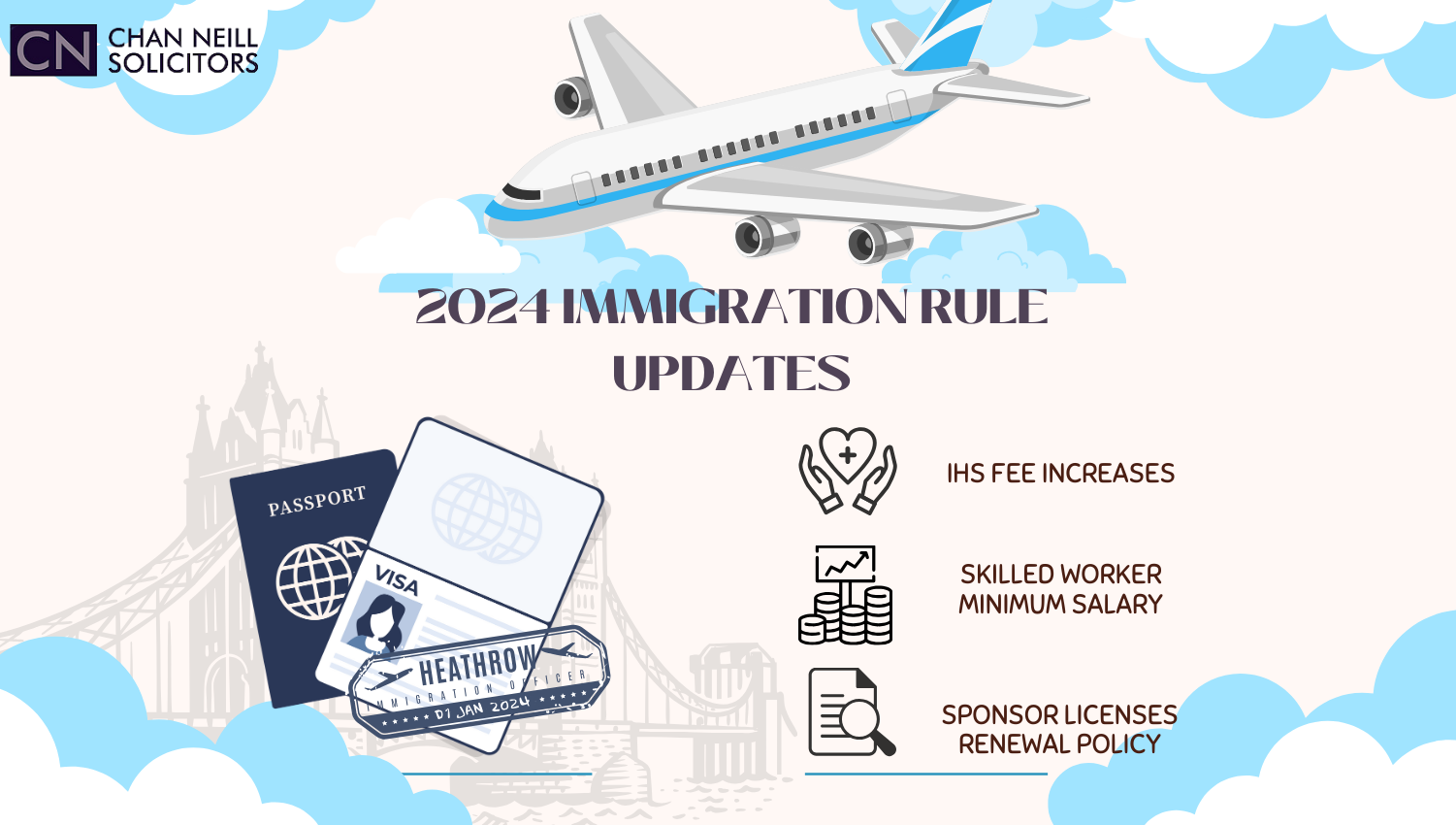
The Immigrant Health Surcharge Rise
The UK government's recent revision of the Immigration Health Surcharge (IHS), effective from 6th February 2024, presents substantial financial challenges for businesses and individuals. The IHS has seen a significant increase, rising from £624 to £1035 annually and an increase from £470 to £776 for children under 18, students and their dependents. This policy change aligns to make a sufficient financial contribution' reflecting the government's commitment to addressing the impact of migration on the NHS.
The IHS is a mandatory fee for those intending to stay in the UK for over six months. While incremental increases in the IHS have occurred since 2019, this recent rise poses a significant financial challenge for businesses reliant on international talent, potentially effecting their ability to attract and retain skilled overseas workers. Companies may need to reassess compensation and benefits packages, revise recruitment budgets, and consider the overall impact on organisational costs. Similarly, individuals, especially skilled workers, and international students, must engage in careful financial planning as the higher IHS fee adds to the overall cost of obtaining a UK visa. This change may discourage some from choosing the UK as their destination for work or study, potentially reducing the available recruitment pool.
Skilled worker minimum salary threshold.
The recent changes in the skilled worker minimum salary threshold announced on 4th December have far-reaching implications. This nearly 50% rise from £26,200 to £38,700 will come into force from 4th April and could lead to reassessing hiring strategies, particularly for sectors heavily reliant on low-paid skilled migrants. The policy will significantly impact the recruitment pool as it becomes more difficult for immigrants to apply for visas and meet the minimum threshold in the UK. While intending to attract highly paid skilled workers, it may also necessitate a review of hiring strategies in sectors dependent on low-paid skilled migrants.
These changes also impact the Graduate Visa route, vital for international students seeking employment in the UK. While the Graduate Route offers opportunities, the new immigration rules and the raised minimum salary threshold may influence career decisions, potentially affecting sectors traditionally employing international graduates. Moreover, when coupled with increased visa application fees and health surcharges, these policy changes create additional hurdles for individuals pursuing work and education in the UK.
Spouse, Partner visas (Appendix FM) minimum income threshold.
Additionally, aiming to reduce net migration, the Home Secretary has announced a gradual increase in the minimum income requirement for Spouse and Partner visas. Starting 11th April, the threshold will increase from £18,600 to £29,000, eventually reaching £38,700 by early 2025. Family visas are crucial for individuals seeking to reunite with their family members, partners, or spouses in the UK. Anyone wishing to bring their family to the UK must consider applying for a visa before the new requirements take effect in April.
The renewal policy for business sponsor licenses.
On the other hand, a significant change in the UK's immigration law regarding business sponsor licenses takes effect from 6th April 2024. This change automatically extends all sponsor licenses set to expire after this date by ten years, eliminating the need for renewal and associated fees. Nevertheless, sponsors with licenses expiring before 6th April 2024 still need to apply for renewal and pay the associated costs to remain licensed. Failure to renew could lead to employment restrictions for sponsored employees. The new policy removes the need for renewal every four years, reducing administrative efforts and costs burdened on businesses.
This change is a significant relief for businesses employing foreign workers. Eliminating renewal requirements means cost savings and less time spent on administrative processes. Businesses can focus more on strategic talent acquisition and management without worrying about sponsor license renewals. With these changes, companies must understand their new responsibilities and opportunities. The extension of the sponsor license validity period marks a positive shift for firms in the UK, simplifying the process of employing foreign talent and providing more stability and predictability.
Given these significant changes, our law firm extends its expertise in providing legal advice and support to navigate the evolving immigration landscape. We assist businesses in understanding and complying with new regulations, optimising recruitment strategies and addressing legal challenges. We also guide individuals, particularly skilled workers and international students in navigating visa applications and career planning amidst these transformative shifts. Our firm ensures that businesses and individuals can thrive in this changing immigration environment.
This article is provided for general information only. It is not intended to be and cannot be relied upon as legal advice or otherwise. If you would like to discuss any of the matters covered in this article, please contact us using the contact form or email us at reception@cnsolicitors.com
Strengthening Law firms in the Wake of the CTS Cyber Attack
The increasing reliance on digital technologies across various industries casts a long shadow of cyber threats, prominently exemplified by the CTS cyber-attack. This significant incident in the conveyancing sector has highlighted the vulnerability of law firms to such digital dangers. More than just causing operational disruptions, the attack served as a critical wake-up call, emphasising the urgent need for robust cybersecurity measures. With cloud-based services now a norm for the easy exchange and storage of information, it is crucial for law firms to be mindful to the security implications of these technologies. The CTS cyber-attack was a clear alert to the potential weaknesses in digital defenses, allowing law firms to develop comprehensive strategies against future intrusions. In this era of digital dependency, strong cybersecurity measures have become an essential cornerstone for industry resilience against ongoing and evolving cyber threats.
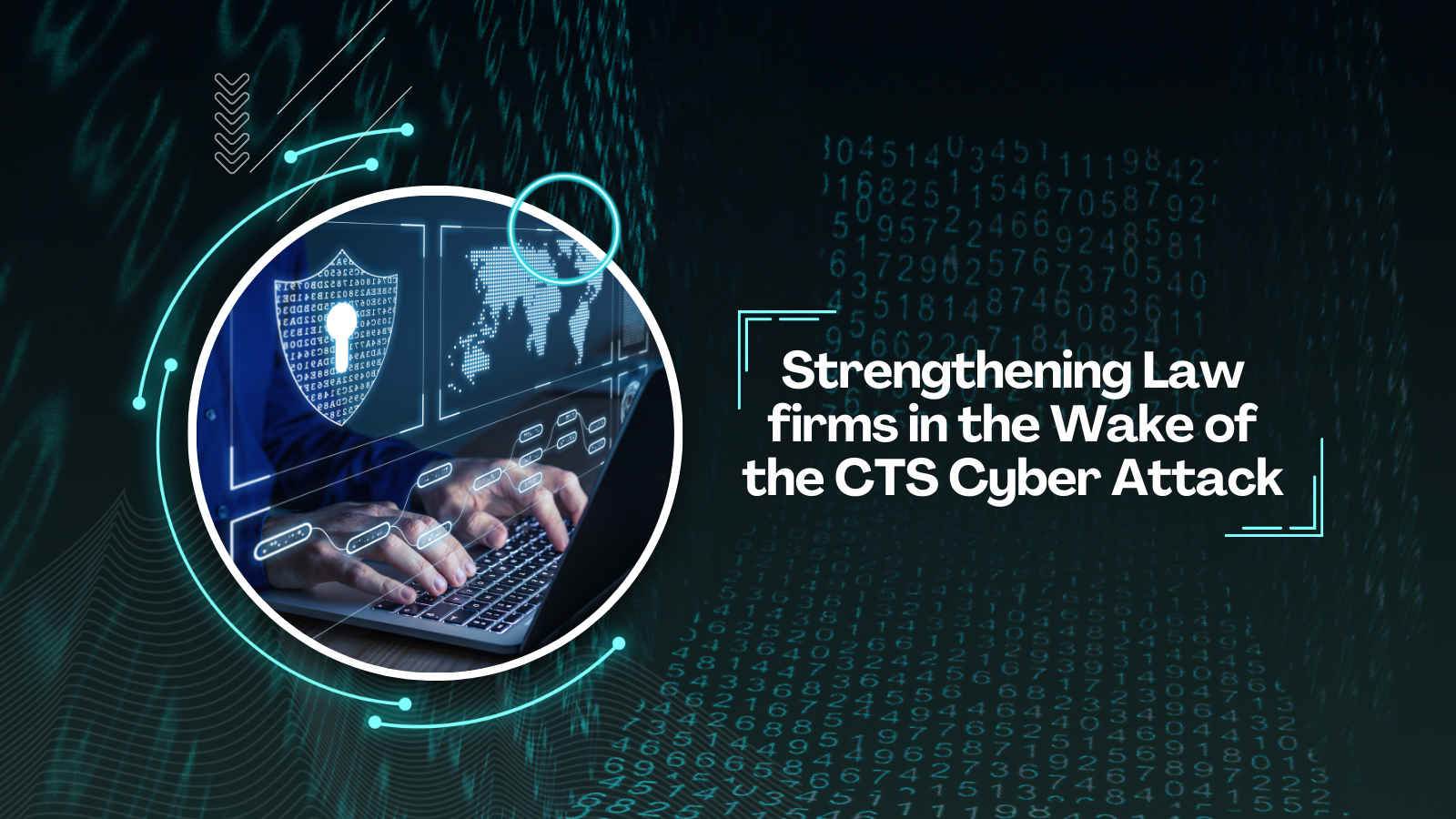
The recent cyber-attack has highlighted the fragility of cloud-based storage and services that countless law firms depend on for managing and sharing data. Despite their apparent convenience, these platforms come with inherent security risks. It is imperative that firms not only choose cloud service providers with robust security measures but also maintain strict access controls internally. The scope and severity of the attack's impact was profound, with more than 80 law firms experiencing varying levels of operational disruption. The inability to access systems, process transactions, or maintain operational continuity led to considerable setbacks in the property exchange process, as highlighted by The Law Society's report on the CTS incident. This starkly illustrates the urgent need for reinforced cybersecurity measures within the legal sector.
In the immediate aftermath of the attack, CTS took substantial steps to restore their systems and reassure their clients. By December's end, CTS announced the restoration of their systems, marking a significant milestone in the recovery process. Yet, this event is a stark reminder that cyber threats are an ongoing concern that will likely escalate. The ramifications of such attacks are profound: the loss of productivity, revenue, and—most critically—reputation, as client trust erodes due to potential data breaches. These consequences underscore the importance of a comprehensive approach to cybersecurity, extending beyond the immediate technical response to include broader operational and strategic considerations.
Reflecting on the cyber attack, it is evident that many law firms were caught unprepared and unable to access their systems or complete essential transactions. This incident highlights the critical need for continuous and robust cybersecurity measures. Law firms must regularly review and upgrade their digital security protocols, adapting them to the ever-evolving landscape of cyber threats. This approach is not merely about implementing security measures; firms must continuously evaluate and adapt to stay ahead of the constantly evolving cyber threats. The CTS incident serves as a pivotal learning experience, indicating that such attacks are not singular events but signs of potential ongoing challenges. Law firms need to proactively minimise the risk of cyber-attacks through regular updates to security practices, comprehensive cyber insurance coverage, and a forward-thinking stance on digital risk management. Embracing this proactive and adaptive approach is crucial for law firms to safeguard against the far-reaching impacts of future cyber disruptions.
This article is to help raise awareness to law firms on how they should continuously review their online presence and reliance upon cloud-based technologies. Criminals target law firms, particularly those that have a property division. Criminals want to try to gain access to data which may assist them in defrauding clients or the lawyers who represent them. The CTS cyber attack is a serious reminder of the constant and evolving nature of cyber threats. It underscored the importance of perpetual vigilance and the need for law firms to consistently update their cybersecurity protocols, invest in comprehensive cyber insurance, and adopt a proactive approach to digital risk management. As firms navigate the complex digital landscape, the lessons from this incident will be invaluable in fortifying their defences against future cyber threats.
This article is provided for general information only. It is not intended to be and cannot be relied upon as legal advice or otherwise. If you would like to discuss any of the matters covered in this article, please contact us using the contact form or email us on reception@cnsolicitors.com
Understanding the Returning Resident Visa: Requirements, Eligibility, and Application Process
Returning Resident visa caters to those who previously had indefinite leave to remain in the United Kingdom (also known as “settlement”) which has now lapsed, and who now want to return to and settle in the UK.
If the visa application is successful, having been granted permission to re-enter the UK, the applicant's residential rights and benefits will be restored.
The Returning Resident visa application must be submitted from outside of the UK and the following validity requirements must be met:
- The application must be submitted on the ‘UKA/ROA/RR’ form or (for applicants under the Windrush Scheme) the ‘Windrush Scheme application (Overseas) form
- The applicant must be outside the UK
- The required fees must be paid (no fee is required for the Windrush Scheme)
- The required biometrics must be provided
- The applicant’s identity and nationality must be established
- There must be a record of the applicant being previously granted settlement in the UK, which has now lapsed due to the absence
On the application, the genuine intention to settle in the UK must be demonstrated as well as strong ties to the country through family, assets or business connections. Furthermore, the length of time the applicant had lived in the UK before their departure will also be a factor in considering whether there is a strong link. As such, the longer the period of residence in the UK was, the more reason will be to believe that the applicant has established a strong connection with the UK.
Important to note that when assessing an application, the Home Office will also take into consideration the reason for the prolonged absence, would it be medical treatment, caring for a family member, overseas employment/self-employment or studies. Overstaying due to inability to travel can also be taken into consideration.
Lastly, some applicants might be subject to a TB test requirement.
The application fee is currently set at £637. The current processing time is 3 weeks. If the application is successful, the passport will be endorsed with an entry clearance vignette valid for 3 months. The BRP card will be available for collection at a designated post office upon arrival in the UK.
At Chan Neill Solicitors LLP we have an experienced immigration team which has been successfully assisting applicants with a Returning Resident visa for many years. Do not hesitate to contact us for advice and assistance.
UK Mortgage | Legal Counsel Approved by Lenders
In the UK, a Loan is a way for most people, especially for office workers to buy a property. With rents in the UK going through the roof, more people are considering taking out a bank loan to purchase a property to have a stable place to live.
The most familiar procedure of purchasing a property is that once the budget has been confirmed and the offer has been accepted by the seller, the seller will need to appoint a property solicitor to handle the whole purchase process for them.
However, it is not necessarily for the buyer to appoint a solicitor with their will.
What is a Bank Panel?
The buyer’s conveyancing must transfer both the deposit and the loan funds to the seller. When obtaining a loan to purchase a property in the UK, it is common practice to engage a property solicitor to represent both the bank, and the lender, and provide various legal documents. It is crucial to instruct a trustworthy property solicitor for the lender’s benefit, therefore, the buyer must gain the Lender’s approval for their chosen property solicitor before proceeding. Failure to do so may result in the lending bank denying the loan application. To facilitate the choice of property buyers, the vast majority of UK banks will pre-screen law firms that they believe are qualified, reputable and can be confidently instructed to add to their list of Panels to work with. That being said, banks are usually only willing with solicitors who are on their panel.
What can Property Solicitors do for Lenders?
If the property is purchased using a mortgage, the buyer will need to provide the Lender with the property solicitor’s details and the Lender will then need to transmit the Mortgage Offer to the solicitor.
Meanwhile, the solicitor is obliged to report to the Lender on relevant circumstances and changes regarding the buyer and the property, such as the results of the AML check on the buyer’s fund for the purchase of the property, and whether there has been a change in the price of the property.
*AML check – Anti-money laundering checks are one of the customer due diligence measures required by regulated businesses to comply with money laundering regulations and prevent financial crime.
All of this can potentially affect the amount the Lender ultimately lends to a buyer.
Before handing over the property, the solicitor will submit a title deed requesting the loan funding following the lender’s drawdown regulations.
So if the buyer doesn’t instruct a solicitor on the Bank Panel, will it still work?
Although there is no requirement to instruct a solicitor on the bank’s Panel to buy a house in the UK. But if you don’t, the Lender will employ another solicitor on their Panel in addition to the solicitor employed by the buyer to look after the transaction.
Then with the seller’s property solicitor, there will be a total of 3 solicitors involved in the property transaction and communication between the parties will take longer.
At the same time, the Lender’s legal fees for appointing a solicitor are generally paid by the buyer, and if the buyer does not choose the solicitor on the Panel, the buyer will have to pay an additional amount for legal fees, so it is not recommended that you do so.
Which banks are Chan Neill Solicitors on the Panel?
Chan Neill Solicitors has been established for 20 years and has built up a good reputation and credibility among clients and various partner organisations as a professional legal institution worthy of trust.
We are Panel members of over 60 banks and financial institutions in the UK, including Lloyds Bank, Barclays, HSBC, Metro Bank, Royal Bank of Scotland, Halifax and other smaller banks or financial institutions. As well as providing legal services to both the buyer and the bank at the time of the purchase, our property solicitors can take care of the formalities required after handover, which include:
- Payment of Stamp Duty Land Tax ( SDLT)
- Land Registry
When the registration of the property is complete, the solicitor will forward the registered title to you to confirm that you own the property. The solicitor will also send a copy of the title deeds to your lender.
If you are planning to purchase a property with a loan, you are welcome to contact Chan Neill Solicitors on Instagram, Facebook, LinkedIn, and Twitter or call us on 020 7253 7781. Our team of property solicitors have extensive experience in acting for both local and overseas buyers and will be able to help you on your journey to settling in your new home.

